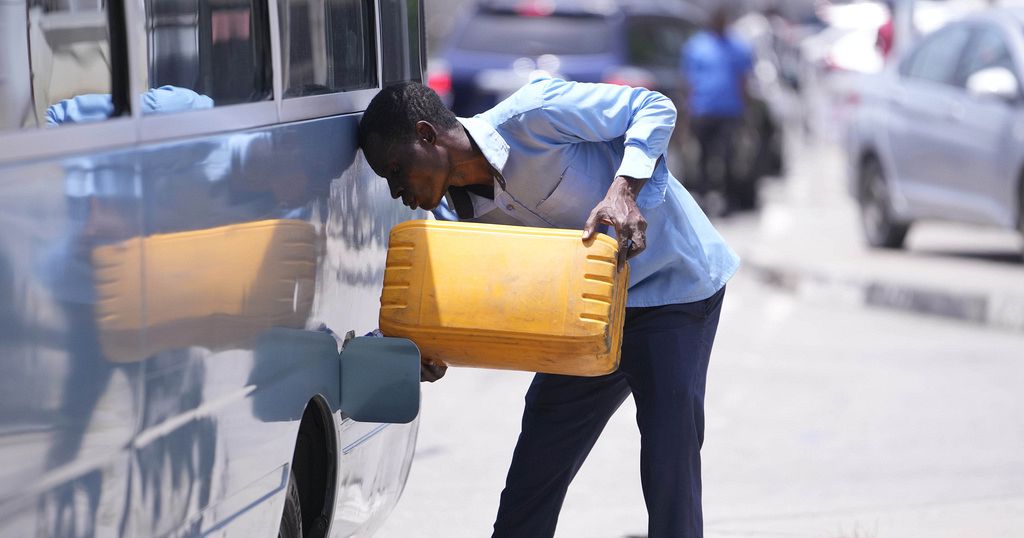Nigeria Faces Fuel Price Crisis: Second Increase in a Month
3 min read
A man pouring fuel in his vehicle using a jerrycan in Nigeria.

A man pouring fuel in his vehicle using a jerrycan in Nigeria.
Fuel prices in Nigeria have surged at gas stations across the country, compounding the challenges faced by citizens grappling with one of the most severe economic crises in decades. The increase, which ranges from approximately 15% to 20%, has left many questioning the sudden rise and the implications it will have on their already strained finances.
This latest hike marks the second significant increase in just over a month. In early September, the Nigerian National Petroleum Company (NNPC) publicly acknowledged its mounting debts to fuel suppliers, leading to an almost 40% increase in fuel prices at that time. The state oil company has yet to provide any explanation for this most recent price surge, further fueling public frustration and uncertainty.
The cost of fuel has long been a contentious issue in Nigeria, where millions of families and businesses rely heavily on gasoline-powered generators due to chronic electricity supply problems. The dependence on alternative energy sources underscores the critical role that fuel plays in the daily lives of Nigerians. For many, the increasing prices mean tougher choices and a further squeeze on household budgets.
As President Bola Ahmed Tinubu’s administration implements reforms aimed at revitalizing Nigeria’s economy, citizens are feeling the immediate impact of these changes. While the government’s goal is to create a more sustainable economic environment, the rapid increases in fuel prices have led to widespread discontent and uncertainty about the future.
The economic landscape in Nigeria has been tumultuous, characterized by high inflation rates and a depreciating currency. The combination of these factors has made it increasingly difficult for citizens to make ends meet. With fuel prices now on the rise again, many worry about the cascading effect on the cost of living and the ability to afford basic necessities.
Businesses, particularly small and medium-sized enterprises, are particularly vulnerable to fluctuations in fuel prices. Increased operational costs could lead to higher prices for goods and services, which would ultimately be passed on to consumers. This cycle can exacerbate the already high inflation rates that Nigeria is experiencing, creating a challenging environment for economic recovery.
Moreover, the lack of transparency from the NNPC regarding the reasons for these price hikes has led to increased skepticism among citizens. Many are calling for greater accountability and clarity on the factors driving these increases, particularly given the company’s earlier admission of significant debts. The absence of clear communication can fuel speculation and further erode public trust in both the NNPC and the government.
As the situation unfolds, the government faces mounting pressure to address the fuel price issue and its implications for the broader economy. Many citizens are looking for assurances that their hardships will be acknowledged and that effective measures will be implemented to stabilize fuel prices and restore public confidence.
In the meantime, Nigerians are left to navigate this challenging economic landscape with limited options. The government’s reform agenda, while necessary for long-term stability, must also consider the immediate realities faced by the population. Balancing economic reform with the need to alleviate the financial burden on citizens will be crucial in the coming months.
As protests and public outcry continue to grow, the Tinubu administration must find a way to address the underlying issues contributing to the fuel price crisis while also taking steps to foster economic recovery. The path forward will require a careful balancing act, as the government seeks to implement necessary reforms without further alienating a population already struggling to cope with rising costs and diminishing resources.
In summary, Nigeria’s latest fuel price increase highlights the ongoing economic challenges faced by the nation. With rising prices affecting millions of citizens and businesses, the government’s response will be critical in determining how quickly Nigeria can navigate through this crisis and work towards a more stable and prosperous future.